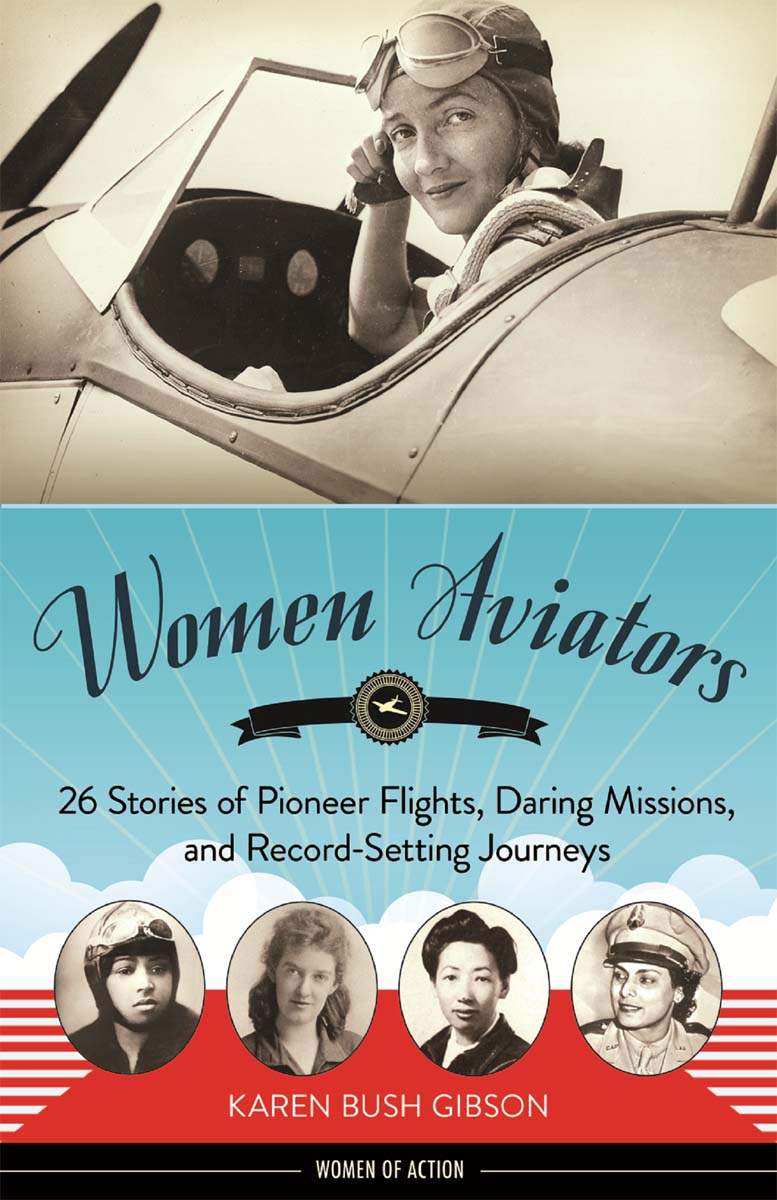Women Aviators
Authors: Karen Bush Gibson



F
rom the very first days of aviation, women were there. Katherine Wright, though not a pilot, helped her brothers Orville and Wilbur so much that some called her the “Third Wright Brother.” In 1910, Baroness Raymonde de Laroche of France was the first woman awarded a license to fly. A year later, Harriet Quimby became the first woman to earn a pilot's license in the United States, and in 1912 flew across the English Channelâanother first.
Women Aviators
profiles 26 remarkable female pilots who sought out and met challenges both in the sky and on the ground, where some still questioned their abilities. Read about barnstormers like Bessie Coleman and racers like Louise Thaden, who bested Amelia Earhart and Pancho Barnes to win the 1929 Women's Air Derby. Learn about Jacqueline Cochran who, during World War II, organized and trained the Women Airforce Service Pilotsâthe WASPsâto serve their country by ferrying airplanes from factories to the front lines and pulling target planes during antiaircraft artillery training. And see how female pilots today continue to achieve and serve while celebrating their love of flight.

OTHER BOOKS IN THE
WOMEN OF ACTION SERIES
Code Name Pauline:
Memoirs of a World War II Special Agent
Double Victory:
How African American Women Broke Race and
Gender Barriers to Help Win World War II
Women Heroes of World War II:
26 Stories of Espionage, Sabotage,
Resistance, and Rescue
Women in Space:
23 Stories of First Flights, Scientific Missions,
and Gravity-Breaking Adventures
Women of the Frontier:
16 Tales of Trailblazing Homesteaders,
Entrepreneurs, and Rabble-Rousers

Copyright © 2013 by Karen Bush Gibson
All rights reserved First edition
Published by Chicago Review Press, Incorporated
814 North Franklin Street
Chicago, Illinois 60610
ISBN 978-1-61374-540-3
Interior design: Sarah Olson
Photo credits:
Alaska Aviation Museum:
p. 161
; Ames Historical Society:
p. 32
; Biblioteque Nationale de France:
p. 84
; Bundesarchiv:
p. 125
(Bild 183-B02092/Schwahn/ CC-BY-SA); Chicago History Museum,
Chicago Daily News
Negatives Collection:
p. 75
; International Women's Air & Space Museum:
p. 192
; Library of Congress:
p. 6
(LC-USZ62-129830); 8 (LC-USZ62-107402); 16 (LC-USZ62-15070); 22 (LC-USZ62-45024); 46 (LC-USZ62-20901); 172 (LC-DIG-npcc-17217); NASA:
p. 67
; National Archives:
p. 90
(#535717); National Association of College and University Halls:
p. 148
; Newark Public Library:
p. 142
; Polar First/Jennifer Murray:
p. 186
; Public Domain:
p. 118
; San Diego Air and Space Museum:
p. 25
;
55
;
61
;
72
;
79
;
136
;
155
;
179
; Texas Women's University:
p. 81
;
197
; US Air Force:
p. 99
;
103
;
104
;
115
; Veterans History Project:
p. 111
Library of Congress Cataloging-in-Publication Data
Gibson, Karen Bush.
Women aviators : 26 stories of pioneer flights, daring missions, and record-setting journeys /
Karen Bush Gibson. â 1st ed.
    p. cm.
Includes bibliographical references and index.
Audience: 12+
ISBN 978-1-61374-540-3 (cloth)
1. Women air pilotsâBiographyâJuvenile literature. 2. Women air pilotsâ HistoryâJuvenile literature. I. Title.
TL539.G53 2013
629.13092'52âdc23
2013007554
Printed in the United States of America
5 4 3 2 1

Baroness de Laroche:
“Bird Woman”
Harriet Quimby:
First Woman to Fly Across the English Channel
Neta Snook:
The Woman Who Taught Amelia to Fly
Part II: The Golden Age of Flight
Amelia Earhart:
The Most Famous Female Aviator in the World
Louise Thaden:
Women's Air Derby Winner
Bobbi Trout:
From Service Station to Airfield
Elinor Smith:
The Flying Flapper of Freeport
Edna Gardner Whyte:
Nothing Could Stop Her from Flying
Katherine Cheung:
The First Licensed Asian American Woman Pilot
Beryl Markham:
African Bush Pilot Crosses Atlantic
Willa Brown:
Integrating the US Armed Forces
Part III: Wartime and Military Flying
Jacqueline Cochran:
Women Pilots Can Make a Difference
Valentina Grizodubova:
The Soviet Amelia Earhart
Hanna Reitsch:
The World's First Female Test Pilot
Pancho Barnes:
Stunt Flyer Extraordinaire
Lynn Rippelmeyer and Beverly Burns:
Airline Pilot Captains
Wally Funk:
Air Safety Investigator
Patty Wagstaff:
Aerobatic Firefighter
Ingrid Pedersen:
Polar Bush Pilot
Ruth Nichols:
Relief Wings in Times of Disaster
Fay Gillis Wells:
Promoting World Friendship through Flying
Jennifer Murray:
Helicopter Flying for Charity
Ida Van Smith:
Teaching Children to Fly
A
T THE TURN OF THE LAST
century, two brothers ran a bicycle shop in Dayton, Ohio. They had a dream of creating a machine heavier than air that could fly in the sky. Although they tried many experiments, they were often greeted by failure. But every time they failed, they would learn something that brought them closer to success. They built a glider in 1902. Then they created a gasoline engine to put in a flyer. Finally, the Wright Brothers developed a successful airplane that first lifted off from Kitty Hawk, North Carolina, on December 17, 1903.
The story of the Wright Brothers' first flight is a familiar story, but mention Katherine Wright and you're likely to get a blank look. Yet without Katherine Wright, it's questionable whether Wilbur and Orville Wright would have succeeded.
As the youngest child and only girl in the Wright family, Katherine was forced to grow up quickly after the death of the mother from tuberculosis. Only fifteen, it became her job to take care of the family. She was particularly close to Wilbur and Orville, who were closer to her age than the two older Wright brothers. She was the only one of the Wright children to finish college.
Katherine arranged for volunteers to help her brothers with the flying machine. She later quit her job to care for Orville, who
had been badly hurt in a crash. She managed her brothers' business affairs and became an officer in their company. Katherine had far better social skills than her brothers, which also helped their airplane receive the right kind of attention. The French were so taken with Katherine that they called her the “third Wright brother” and awarded her and her brothers the Legion of Honor.
